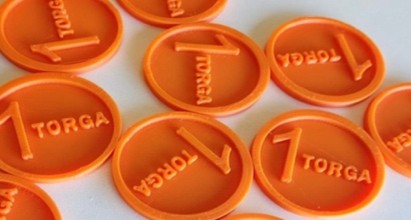Entrepeneurship market

Institution
Agrupamento de Escolas Miguel Torga
Institution Typology
School
Country
Portugal
Stakeholders involved
Parents' association
School Community
Polytechnic Institute of Bragança
Summary
The Entrepreneurship Market activity is transdisciplinary practice that promotes positive reinforcement through a school currency system, the "Torga", a name inspired by the Portuguese poet, Miguel Torga, who gives his name to the institution. Students earn Torgas for good deeds, associated with positive behaviors (help, sharing, collaboration, social and environmental concerns...), accumulating coins throughout the year. The accumulated amounts are then used by students to invest in a business that they themselves create (goods or services) or to make investments and purchases in their colleagues' businesses. They promote marketing actions, fix prices, sell and manage change. At the end of the school year, the amounts accumulated individually are deposited on a credit card and delivered to the school for use in the following year.
The activity combines financial literacy, mathematics, citizenship, creativity and STEAM skills.
CONTEXT AND OBJECTIVES
Problem addressed or learning needs
• Cognitive: marketing, price calculation, change, planning and organization.
• Metacognitive: reflection on sustainable ethical consumption and behavior.
• Collaborative: group work, negotiation, communication
Types of enhanced competences
• Mathematical and financial literacy
• Social and civic competences
• Entrepreneurial spirit
• Creativity and problem-solving
• Autonomy and responsibility
METHODS, STRATEGIES AND TOOLS
Subjects involved
Humanities, Technologies\Engineering, Math, Natural Science, Civic education, Arts
Duration and timeline of implementation
Throughout the school year 2024/2025
Preparation: 3 weeks (creation and design of individual businesses or societies, marketing operations on the created businesses.
Entrepreneurship market: 1 market per semester
Evaluation and closure: last week of th
Strategies and activities
• Creation of 3D coins and custom paper banknotes
• Creation of credit cards
• Attribution of "Torgas" for good deeds
• Business planning (products and services) with family support
• Construction and assembly of stalls and market simulation
• Exchange of goods for "Torgas" during the fair
• Reflection on consumption, efforts and rewards
Material Sources
• 3D printers for coin minting
• Printed paper for banknotes
• Piggy banks built with recyclable material
• Mats/towels for stalls
• Calculation material (paper, pencil, simple calculator)
Methodology
Team Work, Cooperative Learning, Storytelling, Learning By Doing, Inquiry-Based Learning, Flipped Classroom, Technology-Enhanced Active Learning (Teal), Debate
IMPACT AND RESULTS
Impact
n. of students involved – 312
n. of teachers involved: 30
n. of schools involved – 2 of the same institution
Observed Benefits
• Increased student motivation and engagement
• Development of calculation and financial management skills
• Strengthening civic attitudes and responsibility
• Strengthening the relationship between school and families
• Fostering a culture of merit and effort
Challenges Faced
• Ensure equity in the allocation of coins
• Involve all staff consistently
• Standardization of evaluation criteria to assess behaviors for the attribution of currency
• Logistical difficulty in some materials (e.g. coin printing)
LESSONS LEARNT AND RECOMMENDATIONS
Key Success Factors
• Active involvement of the school community (parents, teachers and students)
• Visible and immediate positive reinforcement
• Students' autonomy and creativity
• Integration of STEAM skills
• Consolidate the presence of the Parents' Association in the school
Future Improvements
• Use of digital platforms to register "Torgas"
• Introduction of simple coding tools (Scratch, shop simulators)
• Expansion to other educational levels
• Training for teachers on STEAM project management
Recommendations
• Reinforce the STEAM approach as a work methodology
• Create a clear and shared regulation with all stakeholders

